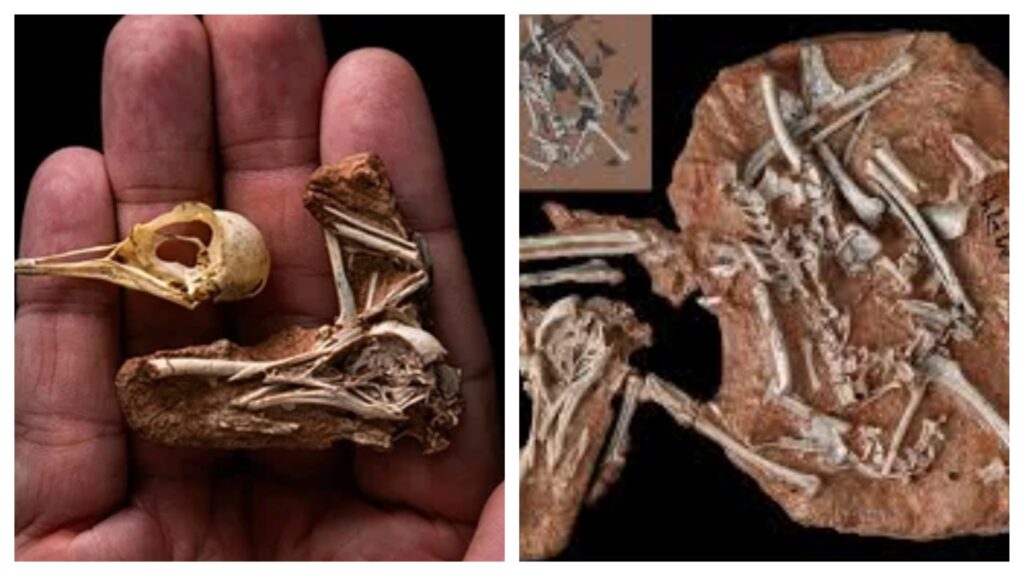Scientists Uncover a Rare 80-Million-Year-Old Ancient Bird Brain Structure, Offering Unprecedented Insights into…see…more
In a groundbreaking discovery, paleontologists have uncovered the remarkably preserved brain structure of an 80-million-year-old ancient bird, shedding light on the evolutionary journey of avian intelligence and behavior. The rare find, made in an arid fossil bed in Patagonia, Argentina, has sent ripples through the scientific community, as it provides one of the most detailed glimpses yet into the neurological anatomy of prehistoric birds.
The fossilized remains belong to a species named Falcatavus antiquus, a previously unknown bird that soared the skies during the Late Cretaceous period. What sets this fossil apart is the exceptional preservation of the braincase, which has allowed researchers to digitally reconstruct the bird’s brain in stunning 3D detail using advanced imaging techniques like CT scanning.
“This is an unparalleled discovery in the field of paleontology,” said Dr. Elena Moreno, the lead researcher from the University of Buenos Aires. “Preserved soft tissues, especially brain structures, are incredibly rare in fossils of this age. This specimen is like a time capsule, offering direct insight into how ancient birds thought, moved, and interacted with their environment.”
The analysis of Falcatavus antiquus’ braincase revealed a brain that was surprisingly complex for its time, with well-developed regions associated with vision and coordination. This suggests that the bird likely relied heavily on sharp eyesight and agile flight, traits that foreshadow the capabilities of modern birds.

The structure of the brain also indicates the presence of an enlarged cerebellum, a feature crucial for balance and precise motor control during flight. This adaptation highlights the evolutionary pressures faced by early avian species as they competed with pterosaurs and other flying reptiles for dominance of the skies.
Researchers believe that the bird’s braincase was preserved so exquisitely due to a combination of rapid burial and the mineral-rich sediment in the region. This unique environment helped protect delicate structures from decomposition and fossilized them over millions of years.
“What we have here is a miracle of nature,” explained Dr. James Carter, a paleoneurologist at Harvard University who collaborated on the study. “The level of detail preserved in this fossil is something we usually only dream of. It’s providing us with a direct look at how brains evolved from dinosaurs to modern birds.”
The findings, published in the journal Nature Communications, are expected to have far-reaching implications for our understanding of bird evolution. They support the hypothesis that the cognitive and sensory capabilities of birds began developing much earlier than previously believed, potentially tracing their roots to theropod dinosaurs.
This discovery also raises new questions about how ancient environmental factors, such as the Cretaceous climate and ecosystem, influenced the development of avian intelligence. Scientists are now planning further studies to compare the brain structures of Falcatavus antiquus with other ancient bird species and modern birds.
The discovery has sparked immense interest not only within scientific circles but also among the general public. Museums and educational institutions worldwide are already vying for the chance to display a replica of the brain reconstruction, which offers a tangible link to a world that existed millions of years ago.
Dr. Moreno’s team is optimistic about what the future holds. “This is just the beginning,” she said. “The fossil record is like a giant puzzle, and every discovery like this brings us one step closer to completing the picture of our planet’s incredible history.”
With further exploration of Patagonia’s fossil beds underway, scientists hope this rare find may be the first of many, unraveling secrets about ancient lifeforms that once ruled Earth. The legacy of Falcatavus antiquus will not only rewrite the story of bird evolution but also deepen humanity’s connection to the distant past.
Leave a Reply